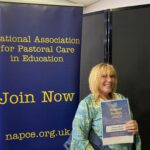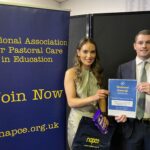REPORT: Chair & Secretary Reports from NAPCE 2021/22 AGM in March
Chair/Secretary Report 2021/22
For The National Association for Pastoral Care in Education (NAPCE)
The Association through the National Executive Committee (NEC) continues to maintain strong financial management and governance.
The NEC at its meetings and through the work of its members ensures sound strategic planning and internal accountability for the activities of the Association.
The NEC ensures, (that as a non profit making charity which aims to support pastoral care in education), the work of its members, NEC and sub committees including the Editorial Board (EB) has the support needed to achieve its aims including administrative, financial, and appropriate insurance.
The National Executive has the responsibility for ensuring that the Association meets the governance expectations of the Charities Commission. The strategic priorities for the NEC this year have been.
- Planning events and conferences, where appropriate in partnership with other organisations to ensure that NAPCE is active in the educational world.
- To expand the activities of the NAPCE to enable the Association to interact with an increasing number of people with an interest in pastoral care in education.
- To develop the role of NAPCE as a provider of training and professional development, to share theory and good practice in pastoral care.
- To continue to develop the structure and organisation of the Association to meet the current and future needs of its members.
- To raise the profile of NAPCE and the Journal in the educational world
Once again this has not been a normal year for the Association because of the impact of the global pandemic.
Like most organisations, the pandemic and restrictions required have prevented events where people meet in person which has historically been an important part of the Associations activities, and this has brought challenges for NAPCE and a need to adapt and work in diverse ways.
The NEC identified the strategic challenges that the restrictions caused by the pandemic would bring to the Association.
- To be financially secure.
- To continue to engage and interact with people with an interest in pastoral care in education.
- To sustain interest in the work of NAPCE, to maintain and increase membership.
- To support professionals with an interest in pastoral care and explore new ways to support professionals, to ensure that the Association continues to have positive role in a changing educational world.
Although in the last two years the NEC has been prevented from organising in person events because of the pandemic, The Association has adapted to the changing situation and been successful in responding to these challenges.
The NEC and EB have developed new skills and ways of working, to support NAPCE in raising awareness about the importance of pastoral care in education.
As we can now be more optimistic about being able to organise in person events in the future the new skills and ways of working that we have developed during the pandemic will provide more options for how NAPCE engages with people who share our interest in pastoral care in the future.
The NEC continues to work closely with the EB to support their work in developing the Journal and to maintain its excellent reputation.
The Association has a positive relationship with the publishers of the journal, Taylor Francis.
They continue to be an important partner in the future development of NAPCE and by providing a regular income to provide financial stability.
The Association once again organised the ‘National Awards for Pastoral Care in Education’ and this has become an important initiative to raise awareness about NAPCE and to engage with more people who share an interest in pastoral care in education.
We are starting to see a connection between people who make nominations for the awards and then become more actively involved in NAPCE and interested in becoming members.
There were more nominations in 2021 than the previous year and they came from different regions in the United Kingdom and other parts of the world.
Awards were presented to the winners selected by the judging panel, in eight categories to recognise the achievements of people working in different areas of pastoral care in education.
The sponsors of the awards included, Inclusion Expert, The Thrive Approach, Taylor and Francis, Association of School and College Leaders, The Hult International School and BlueSky Education.
A presentation event took place online in September because of the pandemic restrictions.
This event was attended by over one hundred people, who joined the live link for the evening.
The areas represented in the United Kingdom included, Manchester, Nottingham, Antrim, Belfast, and attendees also came from Switzerland and Gabon.
Many of the nominees joined the link in groups from their own schools and it was brilliant to be able to recognise and value the examples of good practice in pastoral care that had taken place during the pandemic
A huge thank you Iain Johnson, Susana Cervera and Victoria Bownes, for the organisation of the Awards and the presentation event and a big thank you to the educationalist and author Daniel Sobel for being our guest speaker at the presentation .
- “Thank you NAPCE for organising a great event.”
- “So pleased to see people being valued and recognised for their contribution to pastoral care in schools.”
- “It is brilliant to hear about all this good practice and the difference it is making. Well done everyone”
- “Important for these Awards to recognise outstanding pastoral care. Well done to all the finalists.
- “Well done everyone and thanks for organising such a great event.”
The nominations for the 2022 National Awards for Pastoral Care in Education are now open. Please encourage colleagues and contacts to visit the NAPCE website www.napce.org.uk or follow the link to make a nomination NAPCE Awards 2022 – Entry Form (wufoo.com).
Plans for a conference had to change because of the restrictions from the pandemic for organising live events.
An online conference was organised over three days in July with the title’ Does Every Child Still Matter?
A New Approach to Education.’ There was a programme of three presentations on the first day.
- Combatting Online Sexual Harassment – Why we need RSE More Than Ever – Professor Kaitlyn Mendes, Leicester University
- Promoting Social and Emotional Well-Being. Lee Pritchard, Head of UK Development, The Thrive Approach.
- Pastoral Care post COVID – Connor Acton
On the evening of the second day there was a ‘Pastoral Question Time ‘, with an invited panel to answer questions from delegates.
Chaired by Phil Jones – Chair of NAPCE
On the panel
- Dr Noel Purdy – Deputy Editor of Pastoral Care in Education.
- Margaret Mulholland ASCL SEND and Inclusion Specialist
- Nigel Murray – Paralympic Gold Medallist.
- Mark Diacopoulos, Assistant Professor, Pittsburgh State University,
- Daniel Sobel, Author and Founder of ‘Inclusion Expert’
- Michelle de Middelaer, Educational Consultant, Learning Through Leadership
On the final day of the conference there were three more presentations.
- Building Positive Relationships for Learning – Helen Peter
- Proactive Pastoral Care – Maria O Neil, Author and Founder UK Pastoral Chat
- Engaging Learners – Phil Jones Chair of NAPCE
All the available tickets for links for this free event were ‘sold out,’ with over a hundred delegates attending over the three days.
The event was an important opportunity to maintain the contact with people who are interested in the work of NAPCE, and it attracted 832 visits to the event page on NAPCE’s Eventbrite site.
The Conference was attended by delegates from the United Kingdom, Europe, Asia, Africa, and Australia.
NAPCE is planning another online conference for 2022 with the title, ‘How can effective pastoral care support learners and prepare them for their future roles in society’?
Once again, the Conference will take place over three days with presentations on day one and day three and a Pastoral Question Time on the evening of day two.
Details can be found on the NAPCE Eventbrite page at https://napce2022.eventbrite.co.uk. and tickets can be reserved at https://napce-june-conference-22.eventbrite.co.uk
Links for this conference are limited so please encourage colleagues and contacts to book tickets early to avoid being disappointed as this event in 2021 was sold out.
This is an anniversary year for the Association.
It was 40 years ago this year since the Association was first formed and its members started working on the first publication of the journal ‘Pastoral Care in Education’.
A weekend of events is planned in October to celebrate the anniversary.
These include an anniversary dinner at the lovely setting of Worcestershire Cricket Ground in Worcester with views of the Cathedral and Severn River.
There will be a reception on arrival, a three-course dinner and a bar available until 11-00pm.
We are pleased that Les Walton OBE, has agreed to be our after-dinner speaker.
He has recently published his book ‘Education the Rock and Roll years.
A Northern perspective on a lifetime of learning, teaching and leading where he shares his experiences from his career in education.
A chapter in the book is devoted to NAPCE, and he explains his involvement in creating Gateshead Pastoral Care Association in 1981 and how Michael Marland approached him, a nationally renowned headteacher, who along with other leading educationalists wanted to establish a National Association.
This became the National Association for Pastoral Care in Education in 1982.
This is going to be an important evening for everybody who has been involved in the history of NAPCE or who has an interest in pastoral care and one not to be missed.
Tickets will be available to NAPCE members at a reduced cost and tickets will be available soon.
Other activities that are planned for the anniversary year include.
- A special edition of the journal ‘Pastoral Care in Education’ with guest writers exploring the challenges facing pastoral care in education today and ideas about how pastoral care in education should develop in the next 40 years.
- A two-day conference at the Anniversary weekend at Worcestershire County Cricket Ground, in Worcester, with the title, ‘Is there a need for a new direction for pastoral care in education’? Leading educationalists and experts in research, policy making and good practice in pastoral care in education will be speaking and delegates will be offered workshops to develop their understanding of current issues.
- A live presentation event for the National Awards for Pastoral Care in Education as part of the anniversary weekend of events at Worcestershire County Cricket Ground in Worcester.
- A new NAPCE book about pastoral care in education published by Cambridge Scholars.
The Association continues to form partnerships with organisations with similar interest and values.
The Association was once again actively involved in the planning and delivery of the Association of School and College Leaders, (ASCL) annual conference for Pastoral Leaders in January.
Once again, this year it was an online event and NAPCE contributed with Chair Phil Jones being invited onto the panel to answer questions from delegates.
This was an excellent opportunity to raise the profile of NAPCE, with delegates in leadership roles in primary and secondary schools, attending the conference, from all around the country.
NAPCE was once again invited to contribute to the planning of Safer Internet Day and was a registered supporter of the event.
This is an annual event involving schools and organisations from across the country.
As Chair of NAPCE, Phil was invited to attend the online event in February, that was streamed live from the top of the BT tower in London.
It is good to see NAPCE taking an active role in educational events and activities and that other educational organisation are now approaching NAPCE to ask for our support and contributions to important educational events.
The NEC have continued to take positive action to enable the Association to interact more effectively with other people who share an interest in education and the contribution that pastoral care can make to the learning experience of children and young people.
The Association is pleased to continue working with Iain Johnson from Noise PR.
Iain is managing our social media and supporting the Association with its publicity and marketing.
Iain has made a huge contribution to raising awareness about the work of NAPCE and is making a real impact in helping us to achieve our aim of interacting with more people who share our interest in pastoral care.
The impact of his support can be seen in increased followers on social media and people contacting NAPCE.
Iain produces a monthly newsletter for the Association, which has seen a growing number of people requesting a copy and an increase in the number of people opening and reading the newsletter each month.
The newsletter has published a wide range of articles on pastoral care, written by guest educationalists from other educational organisations as well as contributions from members of the NEC.
The newsletter has become a valuable resource for the latest thinking and sharing of ideas about pastoral care in education and ensures that members and supporters of NAPCE are kept up to date with current information about pastoral care and news about NAPCE events and activities.
This increased interaction has seen more interest, in membership of the Association and there has been an increase in the number of members and subscribers to the journal.
This demonstrates that the work to increase awareness about the work of NAPCE is having an impact.
The Association continues to work with Taylor and Francis to develop the Association’s website.
The Association’s Twitter feed on the website provides the latest news and information and there are links to planned events and activities.
This ensures that the Association is providing its members with current news from the world of education and information to support them in their pastoral roles.
The increased contact with the Association through the website, social media and contact with NAPCE’s administration has continued this year.
NAPCE administration has seen a significant increase in contact by email and telephone which demonstrates how NAPCE has raised its profile and is seen as being important in encouraging awareness about the important contribution pastoral care can make to education.
There have been requests for advice and guidance on a wide range of pastoral issues that members of the NEC have responded to.
Contacts have been about advice on good practice in pastoral care and guidance about the roles of pastoral leaders, pastoral staff, and designated safeguarding leads.
NAPCE through its Twitter page provides support and inspiration for developing good practice in pastoral care.
One area explored on NAPCE’s Twitter page this year was The 25 Reasons Why Pastoral Care is Important in 2022’ which is an example of how NAPCE is stimulating discussion and ideas about good practice.
As the engagement with NAPCE and the interest in our activities continues to increase, the NEC has increased the capacity to provide administrative support.
Anne who looks after communications and Susana who looks after meetings and events in the NAPCE Administrative team have taken on a shared responsibility for Finance after Mel made the decision to step down from this role.
Mel had been the administrator since 2008 and served the Association with dedication and commitment over the past 13 years.
On behalf of the Association we would like to record our appreciation to her and send out very best wishes for the future.
Members of NEC this year have contributed their energy, skills, and expertise to the Association to enable it to continue to expand its activities for its members and raise its profile in the educational world despite the challenges that we have faced because of the pandemic.
The NEC welcomes suggestions about how to raise awareness of the work of NAPCE, and any suggestions about how our members can contribute to discussions about future developments in policy and practice in Pastoral Care and participate in activities to raise awareness about prominent issues in this area of education.
NAPCE is a charity and decisions are made by members who serve on committees on behalf of other members in the best interest of achieving the aims of the Association.
This ensures that the Association can demonstrate to the Charity Commission and others, good governance and ensures that as members, the people making decisions on behalf of the Association are covered by NAPCE’s insurance.
All members are contributing to Association finances, as subscriptions are managed by Taylor and Francis but the funding it generates is returned to NAPCE to support our work.
This has always been good practice that members make decisions on behalf of the membership, and this will be clarified in a proposed amendment to the constitution at the AGM.
Thank you to all members of the National Executive Committee, Editorial Board, Melissa O’Grady, NAPCE Financial Administrator, Anne Jones, Communication Administrator, Susana Cervera, Meetings and Events Administrator, Iain Johnson at Noise PR, Lyndsey Upex, at the Pastoral Care in Education Editorial Office and Abi Amey and her colleagues at Taylor and Francis, for your support, contributions, energy, and ideas this year.
Following the challenging work over the last few years, NAPCE has raised its profile in the educational world and established the foundations to enable it to make a significant contribution to encouraging positive approaches to pastoral care in the future.
We look forward to having the opportunity to meet people in person again who share our interest in the difference effective pastoral care can make in the education and lives of children and young people in this important year for the Association.
Phil Jones, Chair, NAPCE
Jill Robson, Secretary, NAPCE |


































